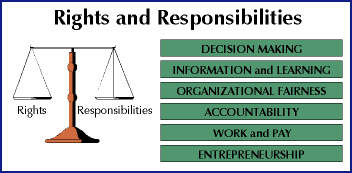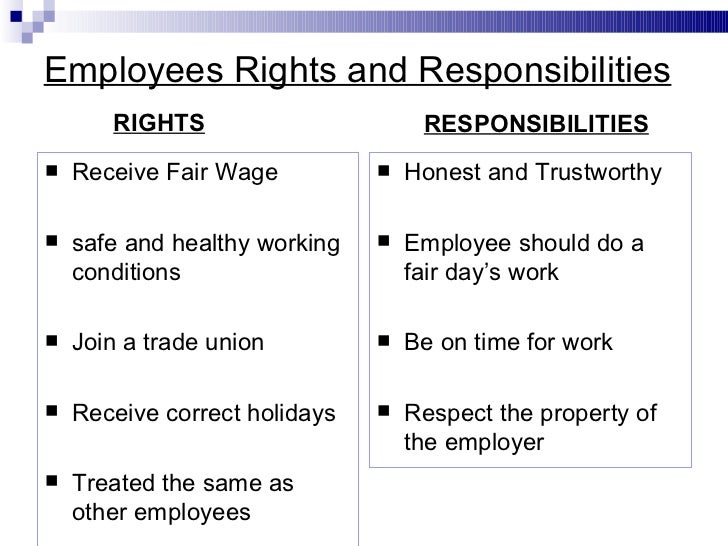Responsibilities Of Employees At Work
Introduction
- Rights And Responsibilities Of Employees At Work
- Employees Safety Responsibilities
- Roles And Responsibilities Of Employees
Employers must ensure that their employees receive certain basic employmentrights. These rights are governed by detailed employment legislation. Ifyou employ people or are setting up a business that will employ people, youneed to be familiar with your responsibilities and your employees’ rights. Inthis document, we focus on your duties to your employees.
Section 25: Duties of employees. Take reasonable care for their own health and safety take reasonable care for the health and safety of others who may affected by their acts or omissions cooperate with anything the employer does to comply with OHS requirements not 'intentionally or recklessly interfere with or misuse' anything provided at. Provide employees, former employees and their representatives access to the Log of Work-Related Injuries and Illnesses. Provide access to employee medical records and exposure records to employees or their authorized representatives. Not discriminate against employees who exercise their safety and health rights.

Definition of an employee
Employers engage people on contracts of service or contractsfor services:
- People engaged under a contract of service are employees and are protected by employment legislation.
- People engaged under a contract for services are independent or self-employed contractors. They are not considered employees and may not be protected by all employment legislation.
The distinction between these types of contract can sometimes be unclear.But the type of contract can have serious implications for the employer andemployee in matters such as employment protection legislation, taxation andsocial welfare.
You can find more information in our documents on different types ofemployment, part-timeworkers, agencyworkers and workerson fixed-term or specified purpose contracts.
Employment services and supports
Intreo is a service from the Department of EmploymentAffairs and Social Protection that provides a single point of contact forall employment and income supports.
Its range of services for employers include:
Rights And Responsibilities Of Employees At Work
- Jobs Ireland – an employment service which gives employers access to jobseekers
- Financial support for employers who create new and additional jobs through JobsPlus and similar schemes
- Workplace supports to assist employees with disabilities, including the Wage Subsidy Scheme and the Employee Retention Scheme
Contracts and terms of employment
If your employees are working for a regular wage or salary, theyautomatically have a contract of employment. The full contract of employmentdoes not have to be put in writing. However, your employee must receive awritten statement of 5 core terms of employment within thefirst 5 days of starting a job.
Best selling books 2018. These core terms are:
- The full names of the employer and employee
- The address of the employer
- The expected duration of the contract (where the contract is temporary or fixed term)
- The rate or method of calculating pay and the pay reference period for the purposes of the National Minimum Wage Act 2000 (a week, a fortnight or a month)
- What you reasonably expect the normal length of the employee’s working day and week to be, in a normal working day and in a normal working week
You must provide the employee with a statement of the remaining terms within2 months of their starting work. You can get details in our document Contract ofemployment.
Most terms and conditions of employment are stated in a written contract ora company handbook. However, custom and practice in the workplace can alsoconstitute a term of employment (for example, a mid-morning break of 10minutes).
If you want to change a term or condition of employment, you must agree thischange with the employee. Under contract law, both the employer and theemployee must consent to changes in theterms of a contract. You can read more about contracts in our document: Contract ofemployment.
Rates of pay
Most workers are entitled to be paid a minimum wage of €9.80per hour. However, there are some exceptions to this, such as apprentices,people aged under 18 and people employed by close relatives. You must give youremployees payslips. Theseshow their wages and any deductions that have been made.
Hours of work, breaks and rest periods
You are responsible for ensuring that your employees are given adequaterest. The Organisation of Working Time Act 1997 sets down the rules governingmaximum working hours anddaily and weeklyrest breaks.
Leave
Nearly all employees are entitled to annualleave and publicholidays, from the time they start work. Most employees are entitled to 4weeks’ paid annual leave for each leave year. Part-time workers’entitlement is generally calculated as 8% of the hours worked, up to a maximumof 4 working weeks for each leave year.
You can decide when your employees take annual leave, taking intoconsideration work and personal requirements. However, you should consult youremployee or their union in advance. Your employee can request pay for annualleave in advance. You must let employees take statutory protective leave, suchas maternity leave,paternity leave,health and safety leave, parental leave, adoptive leave, and carer’sleave. There is specific legislation setting down the rules for eachentitlement.
Tax and PRSI
Malare mounama mp3 download hd. You are responsible for deducting the correct amount of tax, PRSI andUniversal Social Charge from your employees’ wages and remitting these toRevenue using the PAYE system. You also payemployer’s PRSI contributions. You must register as anemployer with Revenue. You can read the Employer’sGuide to PAYE and the changesto the PAYE system in 2019 on the Revenue website. You can get informationabout PRSI on welfare.ie
JobsPlus
The JobsPlusscheme is an employer incentive which encourages and rewards employers whoemploy jobseekers on the Live Register. It aims to encourage employers andbusinesses to employ people who have been out of work for long periods. TheDepartment of Employment Affairs and Social Protection pays the incentivemonthly in arrears over a two-year period. It provides two levels of regularcash payments:
- A payment of €7,500 for each person recruited who has been unemployed for more than 12 but less than 24 months
- A payment of €10,000 for each person recruited who has been unemployed for more than 24 months
Employment records

You must comply with your data protection obligations when collecting CVsand related information about individuals. Legal obligations set out inemployment law have not been affected by the General Data Protection Regulation(GDPR). For example, you must continue to keep certain data, such as records ofemployees’ working hours and rates of pay. These employee records show thatyou are compliant with employment legislation.
You must allow access to these records during an inspection by officers fromthe WorkplaceRelations Commission. See workplacerelations.iefor a guide to how inspections are carried out.

Under data protection legislation, employees can find out what informationan organisation holds about them by making a request to accesspersonal data. You must have procedures in place to respond within 1 monthto personal data access requests from employees. This period can be extended bya further 2 months if requests are complex or numerous – see ‘General DataProtection Regulation’ below.
Health and safety in the workplace
Under the Safety, Health and Welfare at Work Act 2005 employers must, as faras is reasonably practicable, ensure employees’ safety,health and welfare at work. To prevent workplace injuries and ill healthyou must:
- Provide and maintain safe workplaces, machinery and equipment
- Prevent risks from the use of any article or substance and from exposure to physical agents, noise and vibration
- Prevent any improper conduct or behaviour likely to put the safety, health and welfare of employees at risk (‘horseplay’ and bullying at work come under this category)
- Provide instruction and training to employees on health and safety
- Provide protective clothing and equipment to employees (at no cost to employees)
- Appoint a competent person as the organisation’s safety officer
Every employer must carry out a risk assessment for their workplace. A riskassessment identifies any hazards in the workplace, assesses the risks arisingfrom such hazards and identifies the steps needed to deal with these risks. Youmust also prepare a safety statement based on the risk assessment. Tools tohelp you with these tasks are provided by the Health and Safety Authority. You must report anyaccident that results in an employee missing 3 consecutive days at work (notincluding the day of the accident) to the Health and Safety Authority.
Disciplinary procedures anddismissal
The Workplace Relations Commission has a Codeof Practice: Grievance and Disciplinary Procedures. This states thatemployers should have written grievance and disciplinary procedures.Disciplinary procedures set out the stages and process you should follow whendealing with the alleged shortcomings of an employee.
Generally, the procedures allow for informal warnings, which escalate towritten warnings and ultimately to dismissal. Under the Unfair Dismissals Actsyoumust give employees written notice of these procedures before dismissal.
By clicking “I agree” below, you consent to the use by us and our third-party partners of cookies and data gathered from your use of our platforms. See our and to learn more about the use of data and your rights. Walmart new rules for employees employees.
You must give your employees a copy of your grievance and disciplinaryprocedures within 28 days of their starting their contract of employment. Ifyou are considering dismissing an employee, you must follow fair procedures.These include giving your employee appropriate warnings, making them fullyaware of the allegations against them and giving them an opportunity to presenttheir side. You must also give them the opportunity to be represented in anydisciplinary procedures by, for example, a trade union official or otherrepresentative.
Employees Safety Responsibilities
If you do dismiss an employee, you must be able to show you had fairgrounds for dismissal and followed fair procedures.
Roles And Responsibilities Of Employees
You can read about redundancy procedures in our document on closinga business.
Redundancy
If your business closes or you are reducing staff numbers, you may need tomake employees redundant. You may have to do this because there is a lack ofwork, or if you are reorganising the business, or due to the financial positionof the business. When making an employee redundant, you must follow certain procedures.
You can read more about redundancy in our redundancyoverview. You can also find information in our document on closingor selling a business.
General Data Protection Regulation(GDPR)
The GeneralData Protection Regulation (GDPR) came into force across the EU on 25 May2018. This regulation significantly increases employers’ obligations andresponsibilities in relation to how they collect, use and protect personaldata. You can read more about data protection law in our document to dataprotection in the workplace.
If you use CCTV in the workplace or monitor your employees’ use of email,internet and the phone, you can find useful information in our document on surveillancein the workplace. If your employees are working with children or vulnerableadults, they must be vetted by the Garda Síochána NationalVetting Bureau.
Further information
- Workplace Relations Commission’s Information and Customer Service – and see its guide for employers, Employment Law Explained, and the general guide to employment law
- Employers’ Disability Information Service for information and advice on employing staff with disabilities
- IBEC (Irish Business and Employers Confederation)
- ISME (Irish Small and Medium Enterprises Association)